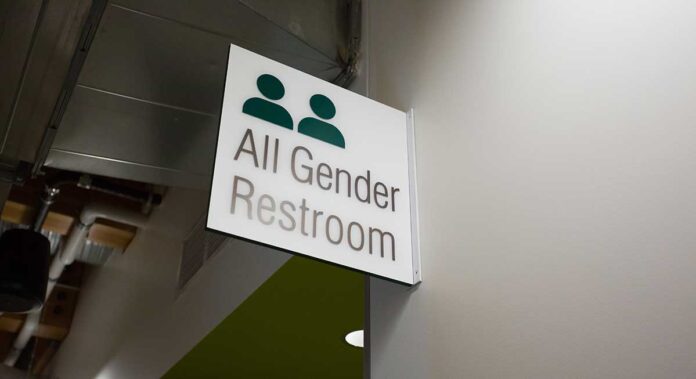Starting in the 2021-2022 school year, which begins August 31, every building in the Philadelphia School District will have at least one single-stall gender-neutral bathroom.
The battle to achieve this simple goal for trans and non-binary people has been ongoing for years in an effort to create a safe and welcoming environment for all students within the School District.
The School District statement reads in part: “School leaders are working to identify restrooms that will be identified as gender-neutral, offering students the opportunity to feel comfortable utilizing restrooms on school grounds.”
Spokesperson Monica Lewis said the School District is “committed to creating an inclusive culture where all students feel valued and know they are in a safe and nurturing learning environment.”
Lewis said a “citywide Gay-Straight Alliance and special mental health support for LGBTQ students will help us meet the goal of ensuring that there is safety, equity, and justice for all students regardless of gender identity or gender expression.”
The school district also unveiled its new programs for LGBTQ students, including ClubPRIDE, a website that connects students to resources.
The ACLU of Pennsylvania lauded the move. “Nobody should ever feel unsafe or anxious about using a bathroom because of their gender identity,” the organization said in a statement.
Julie Zaebst, senior policy advocate for the ACLU of Pennsylvania, who is also the parent of a child in the district, told PGN, “It’s exciting that Philadelphia has made this commitment to ensuring that every school building has an all-gender restroom. This is an important step toward full inclusion of non-binary students and others.”
Zaebst also said that while the news is welcome, the restrooms need to be put in areas that make sense for students who need them.
“How the policy is implemented matters, too. It can’t be further stigmatizing for students. If the only all-gender restroom is far from a student’s classroom, or located in the nurse’s office, or tucked inside a kindergarten classroom, this may not promote inclusion in the way we hope.”
She added, “And certainly non-binary and gender non-conforming students must be free to use the restroom that matches their gender identity, not forced to use the all-gender restroom because of others’ discomfort.”
While this is a victory for trans and non-binary students, it could have — and should have — happened five years ago when the Philadelphia School Reform Commission adopted a policy that immediately broadened the rights of transgender and gender-nonconforming students in the city’s schools.
The guidelines approved in June 2016 allow students to use their bathroom of choice, be referred to by their names and pronouns of choice and participate in gender-segregated groups that correspond with their gender identity. Those guidelines were considered groundbreaking at the time.
Also at that time, Philadelphia School District Superintendent William Hite said in a statement, “We have worked closely with students and members of the LGBTQ community to develop these guidelines. Every student deserves to know their rights will be recognized and upheld at school.”
Hite said, “This policy provides clear guidance and will help to ensure that our schools remain welcoming to all students.”
The School District’s Policy 252, which applies to transgender and gender non-conforming students, requires that schools use gender-neutral language whenever possible and calls on them “to reduce or eliminate the practice of segregating students by gender.”
The new promise of gender neutral bathrooms is a critical statement at a time when anti-trans legislation is happening nationwide. PGN has reported on the breadth of Republican bills attempting to legislate against trans and non-binary youth. So-called bathroom bills have been a focal point for the GOP for years.
On June 28, Gavin Grimm won his six-year court fight to use the boys bathroom at his high school. Grimm began his court battle as a sophomore, but did not end the fight after he graduated.
The U.S. Supreme Court found in Grimm’s favor, but did not rule on the issue overall. The ruling for Grimm impacts public school students in the mid-Atlantic states covered by the 4th Circuit, as well as states governed by the 7th Circuit and the 11th Circuit. Those students can use the bathroom that corresponds to their gender identity. Only 11 states are covered by the Grimm ruling, and Pennsylvania is not among them.
In June, City Councilwoman Helen Gym introduced a bill that would advance gender-neutral accommodations in Philadelphia schools.
“We have had a lot of experiences where young people in schools or after-school programs or residential treatment facilities, if they are gender non-conforming do not feel welcome,” Gym said.
Gym’s bill would require “institutes serving youth” to “establish rules of conduct to recognize and protect transgender and gender non-confirming youth” that match those the School District of Philadelphia utilizes. The legislation would also cover all charter schools in the city, each of which currently sets its own policies, including trans and non-binary accommodations. The new bill would require these schools and programs to update any other policies to match any changes made to School District policy.
Gym said, “We want to see charters in particular having accommodations for trans and gender non-conforming youth.”
The measure will likely come to the City Council floor in the fall.

